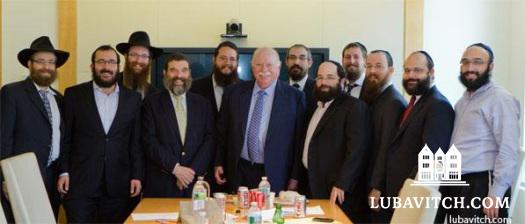With a bevy of educational and social services dedicated to nearly every Jewish demographic, from preschoolers to senior citizens, Chabad representatives have in recent years, independently, and without much fanfare, cultivated another fast growing demographic with astounding success.
Now gaining the attention of many Jewish organizations for their attractive, vibrant profile, young Jewish professionals in their 20s and 30s, out of university but not quite settled, have long had to find their footing in communities oriented towards families, university students, or not at all.
This past July, the Machne Israel Development Fund facilitated and sponsored the first conference with a dozen Chabad Shluchim, each a leader of a community of young Jewish professionals. Hosted at the offices of Roger Hertog, Chairman of the Tikva Fund, the conference was groundbreaking, giving leaders the opportunity to share their best practices, map out priorities and streamline their programs and services towards the development of an international program, the Chabad YJI.
It also gave them an opportunity to compare notes with Michael Steinhardt. Well known for his philanthropy and sponsorship of programs that promote Jewish education, like the popular Birthright Israel, Steinhardt engaged the Shluchim over lunch in a lively discussion exploring core values and outreach methods.
“What I care about,” he said, “is making [this population] Jewishly educated. We need a common noble vision of what it means to be Jewish.” At the end of two hours, any differences between Steinhardt and the Shluchim were eclipsed by their mutual passion for Jewish education, and a set of shared values driving them to engage young Jewish professionals through suitable opportunities for Jewish education.
In Chicago, Boston, Miami, Dallas, New York, and Montreal—among many other cities,, these Shluchim have been working to fill the gap. It is, says Rabbi Avraham Berkowitz, co-director of the MIDF, “the new frontier of Chabad’s outreach.” Berkowitz credits its growth to the success of Chabad on campus.
“So many young Jews benefited from a Chabad-on-Campus experience and want to follow it up after they graduate.
Rabbi Mayshe Schwartz who leads the Chabad Chai Center near Boston with his wife Shifra, says this development is not the result of formal study and strategy. Rather, he explains, it emerged as a result of Chabad Shluchim being out in the field, and discerning a population that did not have opportunities for engagement with like-minded peers. Chabad Chai Center which is located in Brookline, located in Coolidge Corner—a one-stop go-to source for young Jewish professionals, has been sought out by about 2500 such individuals in the greater Boston area. “While many Jewish organizations have recently begun to notice and address this gap,” says Schwartz, his program, like that of his colleagues, has grown organically. “Chabad Shluchim have been dedicating resources and programming to them for almost a decade.”
In downtown Miami, Rabbi Chaim Lipskar focuses much of his efforts on this community. “With the urbanization of downtown Miami which has attracted thousands of young, unaffiliated adults, the program has become a main focus of our work,” says Lipskar, 29, who together with his wife Deenie, counts 4000 young Jewish professionals who’ve connected with them over the last five years.
Chabad’s YJI leaders will roll out a number of programs this fall, a result of the summer conference. JMiami, a discrete matchmaking service will also connect with YJI’s matchmaking services s in other cities in the U.S. and Canada. Also on the launching pad is a national Chabad YJI website, and a humanitarian food program that will engage the services of young Jewish professionals to help food distribution to shut-ins.
Rabbi Yehuda Krinsky, Chairman of the Chabad-Lubavitch social and educational divisions, met with the young Jewish professional leaders at the conference and expects the program to grow rapidly.
The idea of developing a network within this demographic, nationally and internationally is enormously promising. This is a community that is vital now and to the future of Judaism. As educated professionals, they will have great influence within their respective communities. Investing in their Jewish education so that they take ownership of their Jewish identity will make an important difference to the future of our people.

Be the first to write a comment.